Khamenei's Chief of Staff Says Internet 'Bane' Of Regime
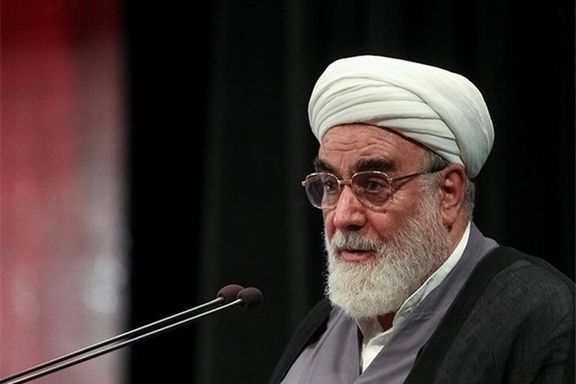
Iran’s Supreme Leader's Chief of Staff says the internet is a scourge, claiming that Ali Khamenei is the main target of people’s attacks.

Iran’s Supreme Leader's Chief of Staff says the internet is a scourge, claiming that Ali Khamenei is the main target of people’s attacks.
According to Iranian media on Friday, Gholamhossein Mohammadi Golpayegani said: “The virtual space has become a bane, but despite their [enemies'] relentless efforts and investments in promoting indecency and other vices, they have not succeeded in alienating people from their religion and beliefs", referring in regime terminology to the US and Israel.
He mentioned large religious ceremonies – sponsored and organized by the regime with rent-a-crowd demonstrations – as proof of the enemies’ failure in their attempts to water down the nation's religious ideology.
His remarks came amid a widespread disregard for religious laws in Iranian society. Despite threats and prosecution by the regime’s authorities, a growing number of Iranian women are appearing in public without mandatory hijab since protests began in mid-September following the death of Mahsa Amini in custody of hijab police.
Touching upon the public's resentment towards Khamenei, Golpayegani claimed that the totalitarian ruler is under most attacks because he is “the main pole” that has kept the regime standing.
Despite numerous attacks against the regime’s military inside the country and on its proxy forces across the region, he said the “enemies” do not dare to attack Iran. During the tirade, he also reiterated regime claims that the entirety of Israel in within the range of the regime missiles.
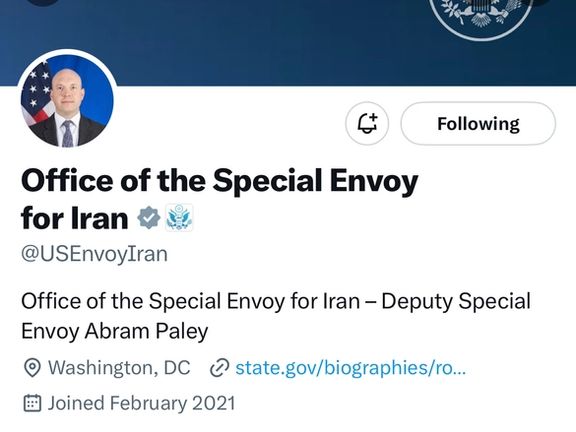
The deputy of former US envoy for Iran has taken over his Twitter account after his suspension for security reasons was reported two weeks ago.
The office of the US Special Envoy for Iran showed its first signs of life following days of media storm about circumstances surrounding former envoy’s dismissal on Friday.
The official twitter account of the mission said: “The Office of the Special Envoy for Iran and the entire team at the State Department remain engaged in implementing our policy on Iran.” The account had been inactive since early June, about a month before Malley’s suspension was announced.
The Biden administration and the State Department are under fire by the Congress, which was kept in the dark about the developments around Robert Malley, including his unpaid leave of absence, suspension of his security clearance and the FBI investigation over his mishandling of confidential information.
The account, whose profile picture has been changed to Deputy Special Envoy Abram Paley – Malley's replacement – added: “We continue our work with allies and partners to constrain Iran’s destabilizing behavior, defend human rights, encourage de-escalation, and promote a stable, prosperous, and more integrated Middle East.”
Malley’s suspension was first reported by Iran International on June 29, and formally announced the following day by Matthew Miller, the spokesperson for the US State Department, calling it "a leave of absence”, adding that his duties would be temporarily assumed by his deputy, Abram Paley. However, it is believed he had been suspended as early as April.
The development came a day after a group of 18 Republican senators called for a probe into the handling of Malley’s security clearance investigation by the State Department.
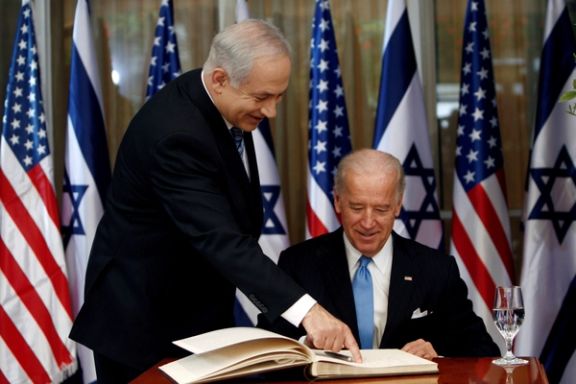
The Wall Street Journal says President Joe Biden’s repeated criticism of Israeli Prime Minister Benjamin Netanyahu, is worse than how he treats “the ruling mullahs in Iran.”
In an editorial on Thursday, the WSJ argued that the Biden administration’s criticisms of Netanyahu’s judicial reforms constitute interference in Israel’s internal affairs, “in which the US President has no business.”
The Journal argued that Biden’s negative comments about Netanyahu’s policies advance the interests of the Islamic Republic of Iran.
“While Mr. Biden undermines the Netanyahu government, Hamas and other Iranian proxies are gaining power in the West Bank, activating another front against Israel. The new wave of terrorism against Jewish civilians will set back the Palestinian cause but advance Iran’s,” the editorial said.
It also criticized Biden for his failure so far to expand the Abraham Accords because of his less than amicable posture toward Saudi Arabia.
“Perhaps most disappointing has been the failure to extend the Trump-brokered Abraham Accords. The Saudis are the prize, but Mr. Biden’s open hostility drove them to hedge their bets by signing a Chinese-brokered deal with Iran instead. Normalization with Israel may have to wait for a U.S. President interested in rallying a coalition to contain Tehran.”
The Wall Street Journal went on the highlight the Biden administration's failure to conclude a “longer and stronger” nuclear deal with Iran, and instead aim for “an unwritten, stopgap agreement “that would give Tehran tens of billions of dollars to sit on the precipice of nuclear breakout. Call it Hezbollah’s and Islamic Jihad’s lucky day.”
The editorial concluded by saying, “While Tehran escalates its proxy wars and whittles down U.S. nuclear demands, Mr. Biden carries out diplomatic offensives against Saudi Arabia and Israel.”
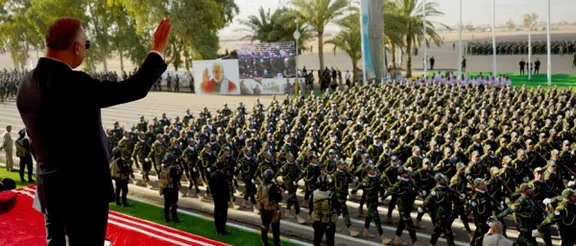
A group of students from Tehran University has expressed opposition to the admission of Iraq’s Hashd al-Shaabi militia forces as students.
In a statement issued on Thursday, the student activists said they would not accept “military forces, whether in combat or school uniforms, within the university premises".
Vowing to resist their presence, which many fear is an attempt to suppress dissidents in the institution, they said that the university’s atmosphere is already poisoned due to the presence of professors affiliated with the regime and Basij militiamen masquerading as students. They accused the authorities of sidelining students by suspending, removing, and suppressing them, while replacing them with borrowed forces from Iraq.
The activists lamented the university's transformation from a symbol of academic independence to a mere instrument of military tyranny, stating, “The presence of these individuals as university administrators only perpetuates a cycle of crises and disasters. Today, we realize that within the minds of those in power, we are denied the right to study and even the right to exist."
In contrast, the student activists highlighted the plight of imprisoned, expelled, and suspended students, who find themselves unjustly excluded for voicing grievances against the regime, while Hashd al-Shaabi forces gain admission.

Al-Hashd al-Shaabi was established back in 2014, following a fatwa to fight ISIS, which controlled four governorates and reached the borders of the capital Baghdad at the time. The Iraqi state-sponsored umbrella organization is composed of approximately 67 different armed factions, with around 128,000 fighters that are mostly Shia Muslim groups, but also include Sunni Muslim, Christian, and Yazidi groups.
Tehran University's public relations office announced members of Iraq's Shiite Hashd al-Shaabi militias and other proxies of the Islamic Republic can study at Iranian universities following a meeting attended between the head of Supreme Leader Ali Khamenei's representatives at the universities and the education deputy of Hashd al-Shaabi.
It has caused outrage among students who also criticized the advantages enjoyed by regime-affiliated students and the rich as well as entrance exam biases, which have discouraged many talented and hardworking individuals from pursuing higher education.
Students hailing from the wealthiest families, and those affiliated with IRGC’s Basij forces as well as those whose family members are war veterans, or what regime calls "martyrs”, have a much greater chance of admission to top universities in Iran, prompting many to blame corruption by the entrance exam ‘mafia’.
The Tehran University students’ statement also emphasized the disparity between the easy entry of members from Hashd al-Shaabi and the obstacles faced by socially and politically marginalized groups within Iranian society. They argued that the university administration's prioritization of military forces over ordinary people and dissidents undermines the principles of equal educational opportunities.
The student movement has played a significant role in the formation and continuation of last year's popular protests, sparked by the death of a 22-year-old woman, Mahsa Amini, in morality police custody. In recent weeks, security forces in Iran have unleashed a fresh wave of crackdowns at universities employing both verbal and physical assault to suppress the student movement.

Prosecutors in western Iran have summoned 54 attorneys to receive a warning because they supported the family of Mahsa Amini who was killed last year in the custody of hijab police.
Prosecutors in Bukan, a city in West Azarbaijan province have said in their summons that the attorneys published social media posts, including texts and photos “violating public chastity principles.” It is not clear how that accusation related to attorneys who last September voiced support for Amini’s family.
Hengaw human rights group said in a report that the attorneys have been under pressure by the prosecutor’s office since last year when they issued their statement.
As the anniversary of Mahsa Amini's killing approaches, Iranian regime officials are concerned that fresh popular protests can break out and have launched measures to intimidate those who have influence in society.
Mahsa Amini was received fatal head injuries immediately after being detained for her “improper hijab” in September 2022. A young Kurdish-Iranian woman who traveled to Tehran with her family members was in coma for three days in the hospital and died on September 16. Immediately protests broke out in the capital and tens of other cities and towns.
The “Mahsa revolution” as it came to be known represented the most serious challenge to the clerical regime and its legitimacy. During nearly five months of street protests the regime killed more than 500 civilians and jailed well over 20,000 people.
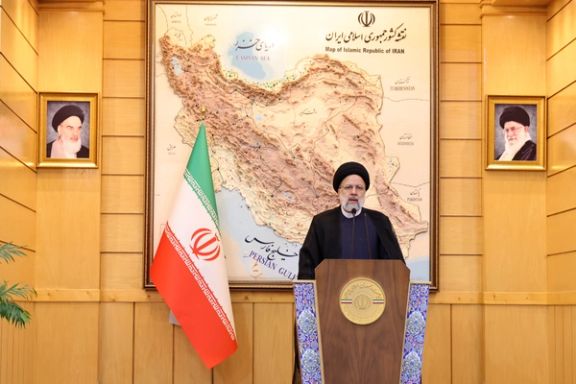
Iran will barter petrochemical products with African countries in exchange for food, President Ebrahim Raisi was quoted as saying after a tour of three countries.
Raisi, who visited Kenya, Zimbabwe and Uganda this week returned to Tehran on Friday and said the first aim of his African tour was to expand “Iran’s strategic depth” on the continent.
Isolated by US and European sanctions, the Islamic Republic has few options to develop economic relations to relieve economic pressure, which has led to very high inflation estimated to range from 70-100 percent. Raisi himself faces sanctions and cannot travel to Western countries.
The official government news website IRNA quoted Raisi as saying that securing “raw materials” and food was the second goal of his trip. He maintained that there is good opportunity for agriculture in Africa and Iran could trade petrochemical products and receive much needed food staples.
All three countries the Iranian president visited are grappling with numerous economic and social crises. Neither Iran nor these African countries have much to offer to each other in trade. However, Raisi said that the Islamic Republic has common ground with the three African countries in opposing “unilateralism”, a reference to Western diplomatic and economic power.
Upon his return to Tehran the president claimed that because of the Islamic revolution Iran has succeeded in establishing wide-ranging ties with many countries around the world. In fact, Iran enjoyed a respected status before the revolution and its citizens had the opportunity of visa-free travel to most countries in the 1970s.